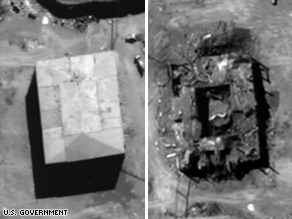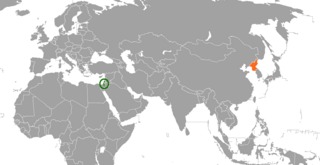
The Korean People's Army are the military forces of North Korea and the armed wing of the Workers' Party of Korea. Under the Songun policy, it is the central institution of North Korean society. Kim Jong-un serves as Supreme Commander and the chairman of the Central Military Commission. The KPA consists of five branches: the Ground Force, the Naval Force, the Air and Anti-Air Force, the Strategic Rocket Forces, and the Special Operation Force.

The foreign relations of North Korea – officially the Democratic People's Republic of Korea (DPRK) – have been shaped by its conflict with South Korea and its historical ties with world communism. Both the government of North Korea and the government of South Korea claim to be the sole legitimate government of the whole of Korea. The Korean War in the 1950s failed to resolve the issue, leaving North Korea locked in a military confrontation with South Korea and the United States Forces Korea across the Demilitarized Zone.

The Treaty on the Non-Proliferation of Nuclear Weapons, commonly known as the Non-Proliferation Treaty or NPT, is an international treaty whose objective is to prevent the spread of nuclear weapons and weapons technology, to promote cooperation in the peaceful uses of nuclear energy, and to further the goal of achieving nuclear disarmament and general and complete disarmament. Between 1965 and 1968, the treaty was negotiated by the Eighteen Nation Committee on Disarmament, a United Nations-sponsored organization based in Geneva, Switzerland.

"State Sponsors of Terrorism" is a designation applied by the United States Department of State to countries which the Department alleges to have "repeatedly provided support for acts of international terrorism". Inclusion on the list imposes strict unilateral sanctions.

North Korea has a military nuclear weapons program and, as of early 2020, is estimated to have an arsenal of approximately 30-40 nuclear weapons and sufficient production of fissile material for 6-7 nuclear weapons per year. North Korea has also stockpiled a significant quantity of chemical and biological weapons. In 2003, North Korea withdrew from the Treaty on the Non-Proliferation of Nuclear Weapons (NPT). Since 2006, the country has been conducting a series of six nuclear tests at increasing levels of expertise, prompting the imposition of sanctions.

North Korea–United States relations refers to international relations between the Democratic People's Republic of Korea and the United States of America. The political and diplomatic relations between North Korea and the United States have been historically hostile, developing primarily during the Korean War. In recent years relations have been largely defined by North Korea's nuclear program – six tests of nuclear weapons, its development of long-range missiles capable of striking targets thousands of miles away, and its ongoing threats to strike the United States and South Korea with nuclear weapons and conventional forces. During his presidency, George W. Bush referred to North Korea as part of "the Axis of Evil" because of the threat of its nuclear capabilities.
The North Korean won or Democratic People's Republic of Korea won is the official currency of North Korea. It is subdivided into 100 chon. The won is issued by the Central Bank of the Democratic People's Republic of Korea, based in the capital city, Pyongyang.

James Norman Mattis is a retired United States Marine Corps four-star general who served as the 26th US secretary of defense from January 2017 through January 2019. During his 44 years in the Marine Corps, he commanded forces in the Persian Gulf War, the War in Afghanistan, and the Iraq War.
The six-party talks aimed to find a peaceful resolution to the security concerns as a result of the North Korean nuclear weapons program. There was a series of meetings with six participating states in Beijing:

Deir ez-Zor Governorate is one of the fourteen governorates (provinces) of Syria. It is situated in eastern Syria, bordering Iraq. It has an area of 33,060 km2 and a population of 1,239,000. The capital is Deir ez-Zor. It is divided roughly equally from northwest to southeast by the Euphrates. Most of the territory on the river's left bank is part of the Autonomous Administration of North and East Syria, while that on the right bank is controlled by the Syrian government.

This chronology of the North Korean nuclear program has its roots in the 1950s and begins in earnest in 1989 with the end of the Cold War and the collapse of the Soviet Union, the main economic ally of North Korea. The Chronology mainly addresses the conflict between the United States and North Korea, while including the influences of the other members of the six-party talks: China, Russia, South Korea, and Japan.

Iran–North Korea relations are described as being positive by official news agencies of the two countries. Diplomatic relations improved following the Iranian Revolution in 1979 and the establishment of an Islamic Republic. Iran and North Korea pledge cooperation in educational, scientific, and cultural spheres. Some media reports claim this cooperation extends to nuclear cooperation, though official U.S. government publications and academic studies have disputed this. The United States has been greatly concerned by North Korea's arms deals with Iran, which started during the 1980s with North Korea acting as a third party in arms deals between the Communist bloc and Iran, as well as selling domestically produced weapons to Iran, and North Korea continues selling missiles to Iran. North Korea and Iran are the remaining two members of George W. Bush's "Axis of evil", which has led to many of the concerns regarding Iran–North Korea relations.

Operation Outside the Box was an Israeli airstrike on a suspected nuclear reactor, referred to as the Al Kibar site, in the Deir ez-Zor region of Syria, which occurred just after midnight on 6 September 2007. The Israeli and U.S. governments did not announce the secret raids for seven months. The White House and Central Intelligence Agency (CIA) subsequently confirmed that American intelligence had also indicated the site was a nuclear facility with a military purpose, though Syria denies this. A 2009 International Atomic Energy Agency (IAEA) investigation reported evidence of uranium and graphite and concluded that the site bore features resembling an undeclared nuclear reactor. IAEA was initially unable to confirm or deny the nature of the site because, according to IAEA, Syria failed to provide necessary cooperation with the IAEA investigation. Syria has disputed these claims. Nearly four years later, in April 2011 during the Syrian Civil War, the IAEA officially confirmed that the site was a nuclear reactor. Israel did not acknowledge the attack until 2018.

Syria and weapons of mass destruction deals with the research, manufacture, stockpiling and alleged use by Syria of weapons of mass destruction, which include chemical and nuclear weapons.
The July 2007 Syrian arms depot explosion was a blast in July 2007 at a highly secretive Syrian missile base. The Syrian government said the explosion was the result of an accidental detonation of an ammunition dump, but later reports suggested it was the result of a Syrian chemical weapons experiment.

Israeli-North Korean relations are very hostile. North Korea does not recognise Israel, denouncing it as an "imperialist satellite". Since 1988 it recognises the sovereignty of the State of Palestine over all of Israel, except for the disputed region of the Golan Heights, which it recognises as part of Syria. Israel considers North Korea and its nuclear missile program as a major threat to global security. It has called for international action on the issue. At times, Israel has been the subject of fiery threats from North Korean state media.
Ali Mahmoud Othman is a Syrian citizen journalist and activist from Homs. He is nicknamed the "Eyes of Baba Amr" and "Jeddo" (Grandfather).
Chong Chon Gang is a North Korean cargo ship, later renamed the Tong Hung San.
The following lists events that happened during 2007 in Syria.

North Korea–Syria relations(Korean: 수리야-조선민주주의인민공화국 관계)) have been very strong and close since the 1964, when North Korea provided military assistance to Syria in its wars with Israel. They maintain embassies in the other country's respective capitals.













